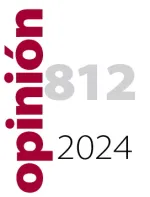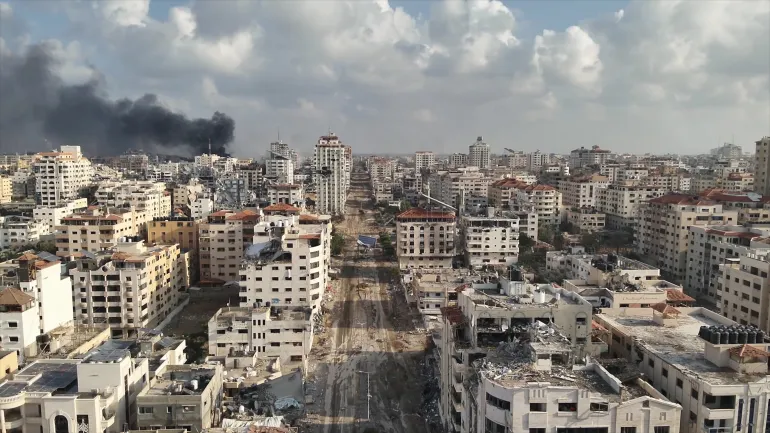The never-ending Nakba spells the decline of the West


One year after the 7th October attack of Hamas which killed 1139 Israelis, thousands of Palestinians have lost their life, and Benyamin Netanyahu has extended his military operations to Lebanon, Yemen and Syria. Hizbollah has been decapitated. But, beyond the dead and the wounded, the major victim of the spectacular violence unleashed on Gaza and Lebanon is the rule of international law.
“I understand that justice must be done. But I caution this – while you feel most rage, don’t be consumed by it. After 9/11 we were enraged in the United States. While we sought justice and got justice, we also made mistakes.” Since those words spoken by President Joe Biden on his visit to Israel on 18th October 2023, less than a week after the attack of Hamas on that country which killed 1139 Israelis, more than 40,000 Palestinians have lost their life in Gaza alone, a majority of them women and children. This small stretch of land on the Mediterranean has been more ruthlessly bombed than any other area of comparable size since the Second World War.
The bombing of Beirut and the killing of Hassan Nasrallah has devastated Hizbollah but solves nothing. It has offered the ultimate diplomatic humiliation of the US and displayed its inability to control its troublesome ally. Each time the US has expressed misgivings about Israeli prime minister Benyamin Netanyahu’s strategy, but each time it has continued to pass the ammunition. Washington’s strategy lies in ruins. The strategy of the European Union finds itself in the same disarray. Jacques Chirac and Gerard Schroeder opposed George Bush’s invasion of Iraq in 2003. That was the last time leading EU statesmen dared to articulate a strategy on the Middle East which diverged from that of America.
International law is the victim of the Middle East crisis
Beyond the dead and the wounded, the major victim of the spectacular violence unleashed on Gaza and Lebanon is the rule of international law and the rules of war which the United Nations attempted to construct after the end of World War II, with the strong support of the United States. Such rules have been openly flouted by the state of Israel ever since it was created in 1948. The imprisonment and torture of young people, the systematic bombing of schools and hospitals have brought victory to Israel but destroyed the lofty ideals on which that state was built. They have left Gaza in ruins, its population crushed. The same fate risks being visited on Lebanon.
As the president of the board of Al-Shabaka, the Palestinian Policy Network, Tareq Baconi, points out, the war that established the state of Israel was a campaign of “ethnic cleansing”, that came to be called the Nakba (catastrophe), which “drove out more than 750,000 Palestinians from their homes”. According to Baconi’s widely shared analysis, “in another sense the Nakba never ended. (It) is not a finite event but an ongoing process of violent dispossession” visible “both in moments of spectacular violence” as over the past twelve months, but also “in the endless grind of colonisation, in mundane everyday routines, and in the ghosts that haunt our domestic lives”. Yet every tactical victory that the Israeli Defence Forces scores in Gaza, in the West Bank and in Lebanon makes the inhabitants of Israel less secure. The country’s leaders are masters at snatching strategic defeat from the hands of tactical victories.
Outside Israel, the most obvious victims, of Prime Minister Benyamin Netanyahu’s ruthless use of violence include leading Western countries and Arab states in the Middle East and North Africa. The capacity of the US to “lead” the “free” world is fast declining. The decline of the EU mirrors that of America. Both have forfeited the respect of many countries in the Global South. The American incapacity to broker a ceasefire will confirm in the eyes of many the decline of a country which has lost every one of its recent wars (Afghanistan and Iraq) and failed in its sanctions’ strategy (Russia, China, Iran and Cuba). European leaders are reduced to a hand ringing silence.
Hypocrisy is not limited to the West. Arab leaders have shown how little they care for ordinary Palestinians. The fate of Palestine is just one factor in the cynical game they play among themselves and with the West. The leaders of Algeria which have strongly supported the Palestinian cause since their country became independent in 1962 allowed only one public demonstration in favour of Gaza last October, so fearful are they that any street protest will turn against the army, which rules the country. For Morocco, gaining Israeli recognition of its sovereignty over the West Sahara in exchange for diplomatic recognition underlines the contempt its leaders feel for their “Palestinian brothers”. Andreas Krieg believes that “the silence of Arab regimes (about Gaza) has also created a lot of friction between the regimes and the people on the ground”. This friction will increase instability in southern rim Mediterranean countries, to the detriment of the EU.
Western misreading of the Middle East goes back a long time
Some European states such as Spain, Belgium and Ireland have dared to criticize Israel. The media in France, Germany and the UK have usually reflected the views of their respective country’s leaders but not of millions of ordinary European citizens who are appalled by the killing fields of Gaza and Beirut. The strong support for Israel of European leaders, particularly in London and Paris, is rooted, historically in what Michael Ancram described a decade ago: “They [the Arab street] roundly believe, not entirely without justification, that we have always only been interested in their region for purely selfish motives, for our own gain. They know from bitter experience that when they have trusted us, we have too often betrayed that trust.”1
The former US ambassador to Saudi Arabia and distinguished scholar of the Middle East, Chas Freeman noted two months before the horrendous Hamas attack on Israel that Israel faced a difficult future. “Zionism’s Ashkenazi founders agreed with their European Christian persecutors that Jews were and ethnic group rather than a religious community. Zionists sought Jewish independence in the mythic Jewish homeland, Palestine, which – with the racist condescension toward non-European native peoples that was typical of the time – they described as a land without people.” This sowed the seeds of today’s Zionist state, which “practices segregation against Arab Israelis in Israel, denies basic rights to West Bank Palestinians and deliberately immiserates and occasionally massacres the nearly 2.2m Palestinians it has imprisoned in Gaza”. The word “occasionally” no longer applies.
The one leader who is pulling the chestnuts from the fire is the Russian president Vladimir Putin who has adroitly used Western missteps in Libya, Syria and the Sahel to reinsert Russia into a position of influence in the Mediterranean. The refusal of Western suppliers of weapons to Ukraine to allow President Volodymyr Zelensky to use those weapons to strike inside Russia stands in sharp contrast, and contradiction, to their refusal to rein in Benyamin Netanyahu. Joe Biden has become an international laughing stock. As for the EU, it has for decades presented itself as a rule “giver” where democracy, economic governance and environmental law are concerned. That sits uncomfortably with its refusal, especially over the past year, to sanction a country, Israel, which has been tearing up the rules of war book for decades.
Note:
1- “How the West lost the Middle East” was a lecture given at Georgetown University on October 1st, 2013, by the former shadow Defence Secretary and Foreign Secretary of the UK Conservative Party, Michael Ancram.
Keywords: Israel, Palestine, Hamas, October 7, Hizbollah, Lebanon, Netanyahu, international law, US, EU, Nabka
All the publications express the opinions of their individual authors and do not necessarily reflect the views of CIDOB or its donors